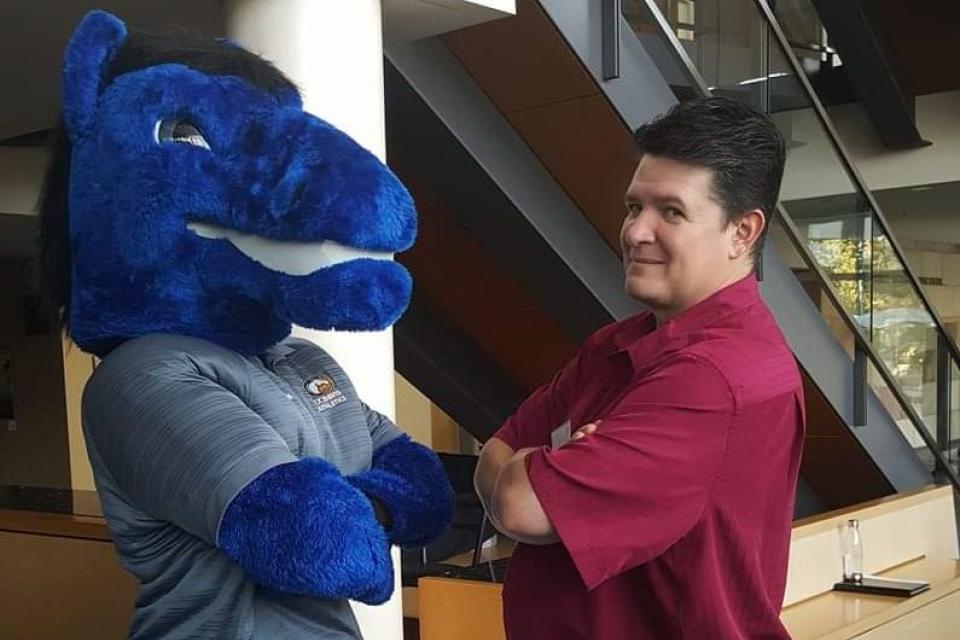At a Crossroads: How My MBA Helped Catapult My Career
Part-Time MBA alumnus now a health care changemaker at Fortune 25 company

In 2016, I was at a crossroads. For over a decade, I had filled business leadership roles in which I drove operating model transformation that would have typically required a graduate-level degree.
But, I didn’t actually have one.
When I first started my career, a formal technology degree was not required for the IT jobs I held at Disney Consumer Products and Mattel. Even so, I always sought to learn more so I could give my best to the teams I led.
Becoming a Black Belt
For instance, I pursued and earned a master black belt in the Six Sigma quality improvement methodology. This better equipped me to lead the team at Blue Shield of California, where I served six years as chief process architect. I earned the black belt so I could improve my skill set, and also because like the rest of my team, we believed in Blue Shield’s mission.
We worked hard every day to transform and deliver sustainably, high quality and affordable health care that we felt was worthy of our family and friends. Armed with the black belt knowledge, I helped our team implement process efficiencies that led to more than $50 million in year-over-year savings alongside improving customer satisfaction.
I also pursued a certification in Risk and Information Systems Controls. Here again, I sought out education to not just improve myself, but also to help out the team. In the health care industry, it’s always a good idea to pursue best practices when it comes to risk management.
At a Crossroads
I could have kept going on this route; but, as I mentioned before, I could see that eventually I would hit a wall in my career if I didn’t make a change.
I knew that if I wanted to be able to continue giving my best at Blue Shield, I needed a credential that specifically fit the health care industry.
I also knew, if I was really going to gain the knowledge that would take me to that next level, I needed the flexibility to take smart risks and own any failure on behalf of my team. Further, if a job change ever became necessary, I doubted I could get an interview for an equivalent role without further education to complement my experience.
That’s when I began to consider going back to school.
20 years Later: Do I Still Have It?
Yet it had been more than 20 years since I completed my bachelor’s degree in economics and communication studies at California State University, Sacramento. I honestly wasn’t sure I could still compete academically after so many years in business. But, when I achieved a decent result on the Graduate Management Admission Test, I decided the time was right to continue my education.
UC Davis MBA: A Degree to Fit My Needs
I chose UC Davis over other UC programs because it offered an educational experience that seemed tailor-made for me. Other programs in the UC system seemed to take more of a cookie-cutter approach, where it seemed like I would be expected to fit myself into the mold.
At the UC Davis Graduate School for Management, however, staff were committed to helping me create an educational experience that filled my specific gaps. The UC Davis MBA program provided a self-directed emphasis on information technology management and a partnership with the UC Davis School of Medicine for a concentration in Public Health.
I enrolled in the Sacramento Part-Time MBA program in September 2017, and I intentionally took the whole experience of earning my MBA very slowly, spreading my classes through March 2021. I did this to ensure I could the keep commitments I made to my family when we started this journey together. It also allowed me to better absorb and apply what I learned in the classroom to my job the very next day.
Seizing New Opportunities
As fate would have it, a compelling career opportunity came my way sooner than I expected. It made me all the more grateful that I decided to pursue my MBA.
In the spring of 2019, while in the middle of my MBA studies, I transitioned to become the director of business transformation at Delegata, a Sacramento-based firm that provides enterprise support to organizations seeking customized strategic initiatives.
Joining a Fortune 25 Company
Then in spring of 2021, just a weeks after I completed my final class, yet another job opportunity came my way. I landed the role as the director of transformation with the Centene Corporation, a Fortune 25 company. Based in St. Louis, Centene is a multi-national health care company with members in all 50 states and worldwide. It’s the largest Medicaid managed care organization, and boasts $135 billion in annual revenue.
I am convinced I would not have had the opportunity to interview at Centene without the work I completed at GSM and the support of UC Davis’ MBA career development team.
Impacting Health Care Nationally and Globally
My team at Centene functions as an internal consulting practice, similar to the teams I led at Blue Shield of California. The difference this time is, instead of simplifying operating models in California alone, this team is finding the best way to approach health-bases system efficiencies that have an impact in all 50 states, and Centene draws in the best of Health Net, Well Care, Magellan, Care 1st, Fidelis Health and other companies that have become a part of Centene during the past decade.
It is exciting to lead a diverse team that has what it takes to build an optimal national system. They inspire me daily, as they are essential to Centene’s operational transformation and to ensuring we keep our promise to improve health outcomes in the communities we serve, one person at a time.
